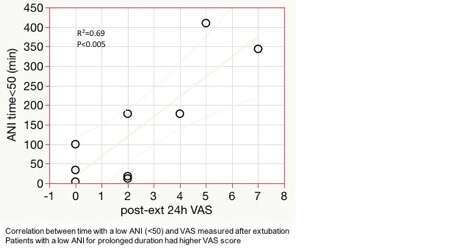
The Analgesia Nociception Index (ANI) Can Predict Pain Level after Extubation in Patients after Cardiac Surgery
Background: Patients following cardiac surgery are frequently transported to the ICU while still anesthetized and mechanically ventilated. Often patients are extubated after a few hours, and during this time they are given sedation and analgesia. These patients, are difficult to assess in terms of pain during this time.
We recently introduced a monitor of nociception (Analgesia Nociception Index – ANI, md mdoloris medical systems) to monitor the parasympathetic system in patients ventilated after cardiac surgery.
Objective: We wanted to evaluate the ability of the monitor to provide information regarding the pain status of the patients ventilated after cardiac surgery.
Methods: In our ICU, patients following cardiac surgery are ventilated for a few hours, most commonly overnight. During this time the patients receive continuous sedation with propofol. We retrospectively analyzed the information from the ANI monitor in 9 patients. And correlated it to the first reported VAS score after extubation.
Results: Duration of a low ANI score indicating greater degree of pain was correlated with increased VAS score at a statistically significant level. (Figure) Low ANI duration was more predictive than doses of opiates administered during and immediately after surgery.
Conclusion: ANI may be able to predict pain after extubation. This requires a prospective assessment to establish clinical utility.


Powered by Eventact EMS